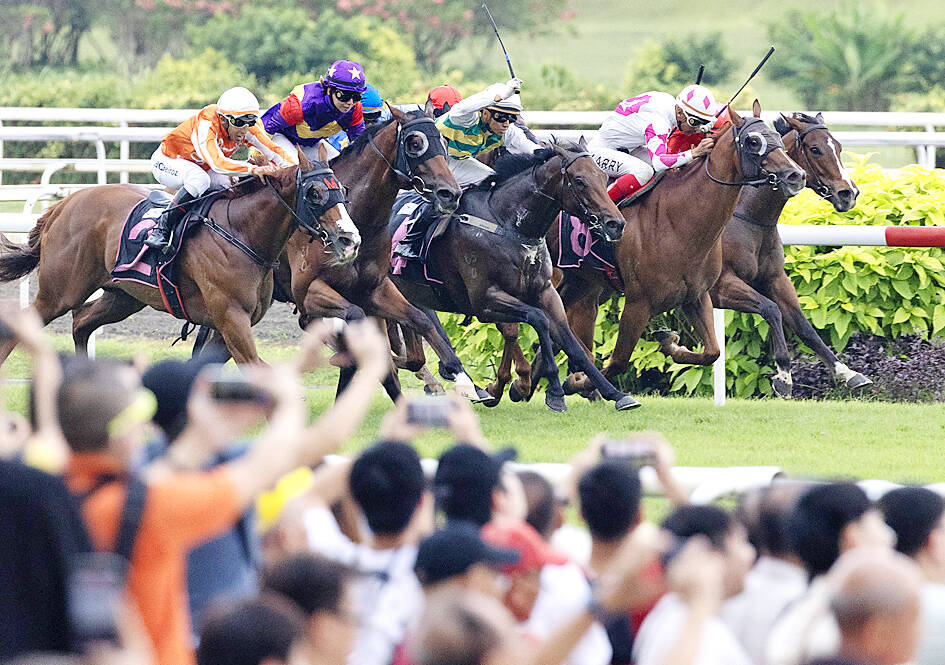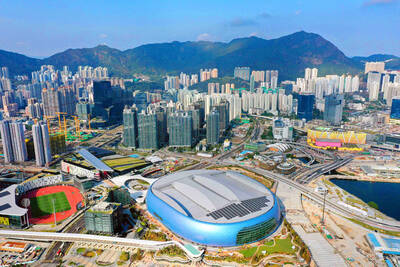More than 180 years of horse racing came to an end in Singapore on Saturday, as the Singapore Turf Club hosted its final race day before its track is handed back to the Singaporean government to provide land for new homes.
Under an overcast sky, the air-conditioned VIP boxes were full of enthusiasts, socialites and expats, while the grounds and betting halls below hosted mostly older-generation punters. The sun broke through for the last race, the last-ever Grand Singapore Gold Cup.
The winner, South African jockey Muzi Yeni, echoed a feeling of loss shared by many on the day.

Photo: EPA-EFE
“I’d like the government to look at it, if I have much say,” he said in a post-race interview.
The site of more than 120 hectares is to be bulldozed for new public and private homes as the nation, smaller than New York City, tries to accommodate a growing population that crossed 6 million this year. The government has said that this is necessary to ensure “there is sufficient land for future generations.”
After some preparation work, the site must be returned by early 2027.
While the decision to end horse racing in the city sent shock waves through the riding and training community when it was announced last year, the sport was already in decline. Spectatorship fell from a race-day average of 11,000 in 2010 to about 6,000 in 2019, before the COVID-19 pandemic cut attendance by more than half. On Saturday, about 10,000 turned up — a third of the stadium’s capacity.
Younger citizens have migrated to other sports and pastimes. Racing in the city is now dominated by the annual Formula One motor race, which last month attracted about 270,000 people to its three-day spectacle and concerts.
Horse racing on the island has always had to contend with the need for land. The Singapore Sporting Club, founded by Scottish merchant William Henry Macleod Read, held its first competition at Farrer Road, north of the city center, in 1843, when the country was a British colony. The event was such an occasion that it was declared a public holiday.
As the city grew and interest in the sport increased, the renamed Singapore Turf Club moved to a site further out after purchasing the Bukit Timah Rubber Estate. The new track opened in 1933 and remained the home of the club until 1999, when it was repurposed for other recreational sports. It has since been earmarked for more homes.
The Turf Club’s final home was built as a S$500 million (US$383 million) state-of-the art facility, with air-conditioned booths, floodlighting for night races and a grandstand capable of hosting 30,000 spectators.
“Singapore was a world leader in horse racing” and the track was one of the best, said Tim Fitzsimmons, head trainer and director of Fitzsimmons Racing, who had more than 50 horses last year and is relocating back to Australia after coming to Singapore in 2007.
“I don’t think it’ll ever come back,” Fitzsimmons said.
Many of the thousands who made the trip on Saturday were pensioners who had been coming to the races for decades. Chain-smoking punters cheering on the thoroughbreds, a wheelchair-bound woman chatting with her friends in a Chinese dialect, balding men scrutinizing crumpled sheets of newspaper for details on the horses: All gathered for this last hurrah.
“It is a nice and scenic place, but its glory days are over, and it is too expensive to upkeep,” said Song Ya-jing, a 77-year-old part-time cook who was accompanying her husband for a last series of bets.
“Maybe my children can live in the public housing one day,” Song said.
At the end of the day, a brief video montage on the main screen and small pyrotechnic display brought a modest end to about two centuries of horse racing in Singapore. Most of the audience was gone before the sun set below the 41 towering light masts.
As the last stragglers took pictures amid discarded betting tickets, the screen flashed its final message: “THANK YOU.”

Shohei Ohtani and Clayton Kershaw on Friday joined their Los Angeles Dodgers teammates in sticking their fists out to show off their glittering World Series rings at a ceremony. “There’s just a lot of excitement, probably more than I can ever recall with the Dodger fan base and our players,” manager Dave Roberts said before Los Angeles rallied to beat the Detroit Tigers 8-5 in 10 innings. “What a way to cap off the first two days of celebrations,” Roberts said afterward. “By far the best opening week I’ve ever experienced. I just couldn’t have scripted it any better.” A choir in the

After fleeing Sudan when civil war erupted, Al-Hilal captain Mohamed Abdelrahman and his teammates have defied the odds to reach the CAF Champions League quarter-finals. They are today to face title-holders Al-Ahly of Egypt in Cairo, with the return match in the Mauritanian capital, Nouakchott, on Tuesday next week. Al-Hilal and biggest domestic rivals Al-Merrikh relocated to Mauritania after a power struggle broke out in April 2023 between the Sudanese army and a paramilitary force. The civil war has claimed tens of thousands of lives and displaced more than 12 million people, according to the UN. The Democratic Republic of the Congo-born Al-Hilal

The famously raucous Hong Kong Sevens are to start today in a big test for a shiny new stadium at the heart of a major US$3.85 billion sports park in the territory. Officials are keeping their fingers crossed that the premier event in Hong Kong’s sporting and social calendar goes off without a hitch at the 50,000-seat Kai Tak Stadium. They hope to entice major European soccer teams to visit in the next few months, with reports in December last year saying that Liverpool were in talks about a pre-season tour. Coldplay are to perform there next month, all part of Hong Kong’s

Shohei Ohtani, Teoscar Hernandez and Tommy Edman on Thursday smashed home runs to give the reigning World Series champions the Los Angeles Dodgers a 5-4 victory over Detroit on the MLB’s opening day in the US. The Dodgers, who won two season-opening games in Tokyo last week, raised their championship banner on a day when 28 clubs launched the season in the US. Dodgers manager Dave Roberts shuffled his batting lineup with all four leadoff hitters finally healthy as Ohtani was followed by Mookie Betts, then Hernandez and Freddie Freeman in the cleanup spot, switching places with Hernandez. “There’s a Teoscar tax to